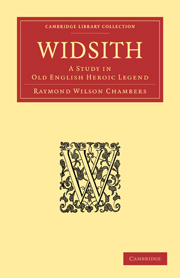Book contents
- Frontmatter
- PREFACE
- Contents
- CORRECTIONS AND ADDITIONAL NOTES
- CHAP. I WIDSITH AND THE GERMAN HEROIC AGE
- CHAP. II THE STORIES KNOWN TO WIDSITH: GOTHIC AND BURGUNDIAN HEROES
- CHAP. III THE STORIES KNOWN TO WIDSITH: TALES OF THE SEA-FOLK, OF THE FRANKS AND OF THE LOMBARDS
- CHAP. IV WIDSITH AND THE CRITICS
- CHAP. V THE GEOGRAPHY OF WIDSITH
- CHAP. VI THE LANGUAGE AND METRE OF WIDSITH
- CHAP. VII SUMMARY AND CONCLUSION
- TEXT OF WIDSITH, WITH NOTES
- APPENDIX
- MAPS AND INDEX
CHAP. III - THE STORIES KNOWN TO WIDSITH: TALES OF THE SEA-FOLK, OF THE FRANKS AND OF THE LOMBARDS
Published online by Cambridge University Press: 16 May 2011
- Frontmatter
- PREFACE
- Contents
- CORRECTIONS AND ADDITIONAL NOTES
- CHAP. I WIDSITH AND THE GERMAN HEROIC AGE
- CHAP. II THE STORIES KNOWN TO WIDSITH: GOTHIC AND BURGUNDIAN HEROES
- CHAP. III THE STORIES KNOWN TO WIDSITH: TALES OF THE SEA-FOLK, OF THE FRANKS AND OF THE LOMBARDS
- CHAP. IV WIDSITH AND THE CRITICS
- CHAP. V THE GEOGRAPHY OF WIDSITH
- CHAP. VI THE LANGUAGE AND METRE OF WIDSITH
- CHAP. VII SUMMARY AND CONCLUSION
- TEXT OF WIDSITH, WITH NOTES
- APPENDIX
- MAPS AND INDEX
Summary
The North-Sea tribes in the time of Tacitus. The Frisians and Finn
Hitherto we have been following the stories of those chiefs, Ermanaric, Attila, Gundahari, who led their German hordes within ken of the historians of the Roman Empire, and concerning whose historical existence we therefore have definite, if scanty, information. To turn from these stories to those of the North-Sea folk, the native stuff of our English heroic poets, is like moving from a room lighted by the occasional flash of a dying fire to one where we have to grope in absolute darkness. For to the Romans these Northern tribes were little known, and that chiefly during the struggle under Tiberius and Germanicus. It is one great merit of Tacitus' Germania that it preserves to us fragments of that information concerning our forefathers, which was acquired during this struggle. For by the time of Tacitus himself the Romans had withdrawn west of the Zuider Zee and of the Rhine: and these coast tribes had passed out of their sight.
The name Ingaevones which these coast tribes possessed in common rested, Tacitus tells us, upon a belief that they were all sprung from one eponymous ancestor Ing. Most westerly of all these maritime peoples dwelt the Frisians, amid those ‘vast lakes navigated by Roman fleets,’ which have since become the Zuider Zee. Tacitus recognises two groups of Frisians—the Lesser Frisians, dwelling apparently to the west of these lakes, near the Roman frontier, and the Greater Frisians, dwelling in the unexplored marshes of the North and East.
- Type
- Chapter
- Information
- WidsithA Study in Old English Heroic Legend, pp. 66 - 126Publisher: Cambridge University PressPrint publication year: 2010First published in: 1912



